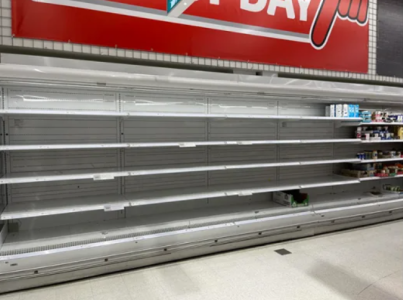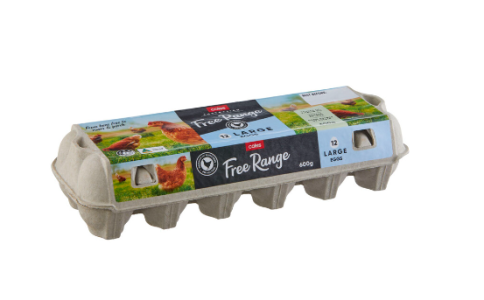Is an egg shortage imminent? Empty Coles, ALDI shelves spark concerns
Eggs are an essential staple for many Aussies, but it seems the supply of eggs in our supermarkets is dwindling.
This week, a worrying photo of empty shelves at Coles’ Sippy Downs branch in Queensland sparked concern among shoppers about egg shortages nationwide.
'Is this a trend or anomaly?' the Queenslander asked Reddit users under the caption: 'Egg shortage?'
Fellow shoppers from all over Australia joined the conversation, with many confirming the same shortage in ALDI supermarkets, their local Coles branch and in other states.
A Coles spokesperson addressed the concern and stated, ‘We're continuing to monitor supply and are working hard with our suppliers to improve availability for our customers.’
‘We know that the Australian egg market is under pressure due to cooler weather, high feed and input costs, along with significant outbreaks of avian influenza in Europe and North America, resulting in a decrease in global supply,’ the spokesperson added.
Some Aussies believe that other factors are involved in the shortage as well. ‘Supply problems trend as we move more towards cage-free eggs. Been happening randomly in Canberra as well,’ an ACT resident chimed in, referring to the recent move by supermarkets to shift to free-range and barn-laid eggs.
Both Woolworths and Coles aim to end the practice of keeping poultry in battery cages by phasing-out cage eggs by 2025. This move means a considerable difference in prices between caged eggs–which retail for $4 a dozen—and the free-range alternative–which go for $8 or $9 a dozen.
The number of welfare issues related to caged egg production is why Coles committed to the industry’s 2025 cage-free target. According to their website, their company is ‘committed to working towards a sustainable future that supports local farmers and food producers, while also looking after the welfare of animals’.
On the other hand, a Woolworths spokesperson explained that there are different reasons behind the egg shortage. ‘Across the market, in both retail and hospitality, egg supply has been reduced over the last 18 months due to a range of factors, including weather, on-farm and input costs,’ they said.
At this stage, it has yet to be known whether the egg supply issues will spread to other supermarkets and if prices for this grocery staple will continue to climb.
In the meantime, shoppers are advised to keep an eye out for updates from their local egg suppliers and supermarkets, and if you have any concerns, make sure you get in touch with store reps to let them know.

Is this the case in your local supermarkets, dear members? Let us know in the comments!
This week, a worrying photo of empty shelves at Coles’ Sippy Downs branch in Queensland sparked concern among shoppers about egg shortages nationwide.
'Is this a trend or anomaly?' the Queenslander asked Reddit users under the caption: 'Egg shortage?'
A Coles spokesperson addressed the concern and stated, ‘We're continuing to monitor supply and are working hard with our suppliers to improve availability for our customers.’
‘We know that the Australian egg market is under pressure due to cooler weather, high feed and input costs, along with significant outbreaks of avian influenza in Europe and North America, resulting in a decrease in global supply,’ the spokesperson added.
Some Aussies believe that other factors are involved in the shortage as well. ‘Supply problems trend as we move more towards cage-free eggs. Been happening randomly in Canberra as well,’ an ACT resident chimed in, referring to the recent move by supermarkets to shift to free-range and barn-laid eggs.
Both Woolworths and Coles aim to end the practice of keeping poultry in battery cages by phasing-out cage eggs by 2025. This move means a considerable difference in prices between caged eggs–which retail for $4 a dozen—and the free-range alternative–which go for $8 or $9 a dozen.
The number of welfare issues related to caged egg production is why Coles committed to the industry’s 2025 cage-free target. According to their website, their company is ‘committed to working towards a sustainable future that supports local farmers and food producers, while also looking after the welfare of animals’.
On the other hand, a Woolworths spokesperson explained that there are different reasons behind the egg shortage. ‘Across the market, in both retail and hospitality, egg supply has been reduced over the last 18 months due to a range of factors, including weather, on-farm and input costs,’ they said.
At this stage, it has yet to be known whether the egg supply issues will spread to other supermarkets and if prices for this grocery staple will continue to climb.
In the meantime, shoppers are advised to keep an eye out for updates from their local egg suppliers and supermarkets, and if you have any concerns, make sure you get in touch with store reps to let them know.
Key Takeaways
- A photo of empty shelves at a Coles supermarket in Queensland has raised concerns about potential egg shortages in Australia.
- Many Australians have reported similar observations at their local Coles and ALDI branches and in other states.
- A spokesperson for Coles acknowledged the supply issues, citing cooler weather, increased feed costs, and significant outbreaks of avian flu in Europe and North America impacting global supply as some of the factors behind the problem.
- Both Coles and Woolworths are phasing out caged eggs, which some believe may have added to the supply issues and has increased egg prices for consumers.
Is this the case in your local supermarkets, dear members? Let us know in the comments!









